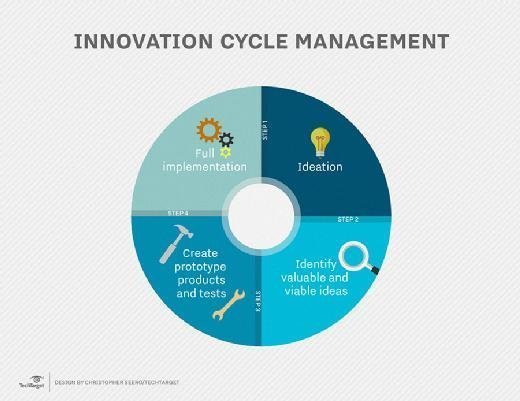innovation manager
What is an innovation manager?
An innovation manager is an employee whose responsibilities focus on the development of new products, services or processes.
IT innovation is the lifeblood of the technology industry. It's the driving force that propels employees toward new discoveries, methodologies, products and services. At its core, innovation is about fresh thinking that creates value. It transcends traditional boundaries, pushing the envelope of what's possible and transforming the status quo into the extraordinary.
Why is innovation critical?
In the technology industry, innovation is particularly critical. Given the rapidly changing landscape, tech companies are perpetually in a race against obsolescence. Every advancement, whether incremental or breakthrough, plays a vital role in maintaining competitiveness, fostering growth and unlocking new opportunities.
Technology giants such as Apple, Google, and Amazon consistently top global innovation rankings, demonstrating a relentless commitment to pushing boundaries and exploring uncharted territories.
However, the process of innovation isn't spontaneous. It requires careful nurturing, guidance and management to thrive. This is where the role of the innovation manager comes into play.
Roles and responsibilities of an innovation manager
Modern organizations have realized that to innovate consistently and effectively, they need dedicated roles to manage and steer the innovation process. It's no longer sufficient to rely on occasional sparks of brilliance or sporadic team brainstorming sessions.
Today's complex and dynamic business environment necessitates a structured and strategic approach to innovation -- one that can identify opportunities, guide creative ideation, manage the development of new concepts and ensure successful implementation.
Innovation managers operate with both creativity and business acumen, driving initiatives that cultivate an innovation-friendly culture, streamline the execution of new ideas, and ultimately unlock value for the organization and its customers.
With the rapid pace of technological advancement and the growing competition in the tech industry, the role of innovation managers has become more crucial than ever before. Let's take a closer look now at what their day-to-day responsibilities look like.

Identifying opportunities for innovation
Innovation managers continuously scan the environment for emerging trends, technologies and potential disruptions. They look for gaps in the market, customer needs and areas for improvement within their organization.
Here are a few important aspects of the innovation manager position:
Develop and implement innovation strategies
Based on their observations, innovation managers create strategic plans for innovation. These strategies guide the ideation process; resource allocation; and the development and launch of new products, services, or processes.
Manage the innovation pipeline
They oversee the process from ideation to implementation. They manage various projects, ensuring that ideas are developed, tested and brought to market successfully.
Foster a culture of innovation
Innovation managers encourage creative thinking and risk-taking within the organization. They might conduct workshops, training sessions or brainstorming sessions and often set up systems to collect and evaluate ideas from all levels of the organization.
Measure innovation performance
They establish metrics to measure the success of innovation initiatives, tracking progress, and adjusting strategies as necessary. This could include measures like return on investment, time to market or impact on customer satisfaction.
Interact with other roles
As a role with a wide range of responsibilities, innovation managers interact closely with various departments within a tech company. They often work together with research and development teams to translate ideas into feasible products or services, ensuring that creativity aligns with technical feasibility.
They will also collaborate with marketing and sales teams to understand customer needs and market trends as well as ensure successful product launches. They report to and work with top executives to shape the organization's innovation strategy and secure necessary resources.
Furthermore, Innovation managers partner with HR to create programs and practices that foster a culture of innovation, such as recognition systems for innovative ideas or training programs to develop creative thinking skills.
Required skills and qualifications of an innovation manager
The role of an innovation manager is multifaceted, requiring a blend of technical and soft skills:
Technical skills
- Strategic thinking and planning. Innovation managers need to think strategically and create detailed innovation strategies. This requires a deep understanding of the organization's objectives, the competitive landscape and market trends.
- Project management. Managing the innovation pipeline is a core responsibility of this role. As such, they need strong project management skills to keep projects on track and within budget as well as meet objectives.
- Industry knowledge. Given the dynamic nature of the tech industry, having a thorough understanding of industry trends, emerging technologies and competitor activities is vital.
- Data analysis. The ability to analyze data and draw meaningful conclusions is crucial. Innovation managers use data to identify opportunities for innovation, measure the impact of their initiatives, and adjust strategies as necessary.
- Education and experience. Most innovation managers have a bachelor's degree in business, management or a related field. Some have a master's degree. In terms of experience, they often have a background in a relevant role where they've demonstrated innovation, leadership and strategic thinking.
Soft skills
- Creativity. As the driving force behind innovation, innovation managers should be imaginative and open-minded, capable of thinking outside the box to find novel solutions to complex problems.
- Leadership and influence. They need to inspire others to embrace and contribute to innovation. This requires strong leadership and the ability to influence at all levels of the organization.
- Collaboration and communication. As they interact with various departments within the company, effective collaboration and clear communication are key.
- Risk tolerance. Innovation involves uncertainty and risk. Innovation managers should be comfortable with this and capable of encouraging others to take calculated risks.
- Resilience and adaptability. Innovation doesn't always go as planned. Being resilient in the face of setbacks and adaptable to change is crucial.
Future trends in innovation management
As the technology landscape evolves rapidly, the role of the Innovation manager is poised to become even more critical and complex. Here are some trends and considerations for how this role may evolve:
Greater emphasis on sustainable innovation
As societal focus on sustainability and social responsibility continues to grow, innovation managers will likely need to align their strategies with these principles. This means not just driving profitability but also considering the environmental and social impact of their innovations.
Exploiting the potential of emerging technologies
Emerging technologies like artificial intelligence, machine learning, blockchain and the internet of things are creating new possibilities for innovation. Innovation managers will need to stay abreast of these technologies and understand how to harness their potential to drive novel solutions and create competitive advantage.
Increased need for cybersecurity innovations
With the digital transformation of businesses and the growing sophistication of cyber threats, there's a rising need for innovation in cybersecurity. Innovation managers may increasingly be called upon to drive initiatives that strengthen cyber defenses and create more secure digital ecosystems.

More cross-industry collaboration
Innovation is becoming more interdisciplinary, often requiring the fusion of insights and technologies from different industries. As such, innovation managers may need to be adept at forming and managing partnerships across industry boundaries.
Greater focus on organizational agility
As the pace of change accelerates, the ability to innovate quickly and adapt promptly is crucial. Innovation managers will likely be pivotal in fostering organizational agility, ensuring that companies can pivot swiftly in response to new opportunities or threats.
Overall, the role of the innovation manager is set to become more integral as the pace of technological advancement quickens. The pressure to innovate is becoming a constant, driving the need for dedicated roles to manage and guide this complex process.
With their unique blend of technical knowledge and soft skills, innovation managers will play a pivotal role in steering companies toward a future marked by relentless change and boundless possibilities.
Learn about IT-business alignment and why it is important and read about five big digital transformation trends.







